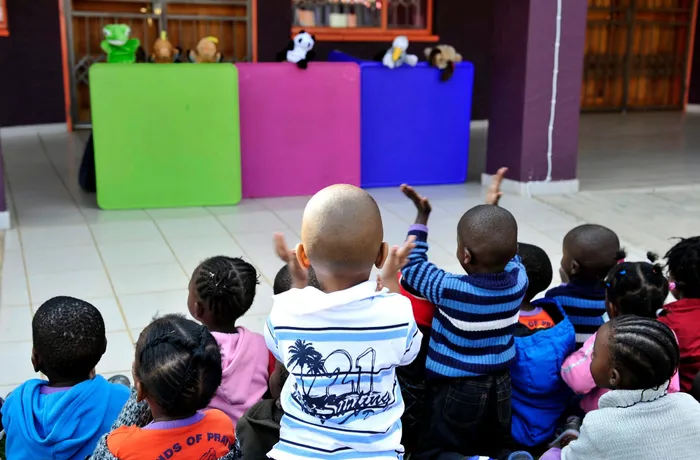Thrive by Five Index reveals alarming developmental gaps among children under five in South Africa

The Thrive by Five Index 2024 reveals that children from disadvantaged backgrounds in South Africa are falling behind in early development.
Image: Independent Newspapers Archives
A report on the development of children under five has made the damning finding that children from poorer communities are falling behind even before they start formal schooling.
The Thrive by Five Index was released last month by the Department of Basic Education and other organisations with an interest in the sector. This is the second such report in the past few years. The Department of Basic Education said the findings from the report laid bare the areas that should be their primary focus.
The Thrive by Five Index 2024 represents South Africa’s most comprehensive effort to date to assess the developmental status of four-year-old children across the country, grounded in the Nurturing Care Framework for Early Childhood Development.
The index is designed to provide a clear, regular picture of how young children are developing in key domains and how the early learning environment, household conditions, and broader social context contribute to this development. The 2024 Index states that children who are nourished and nurtured in supportive environments—at home and in other care or educational settings—are more likely to be healthy, emotionally secure, and developmentally on track, increasing their chances of thriving and reaching their full potential.
Among the key objectives of the report is to determine the proportion of young children in South Africa who attend Early Learning Programmes (ELPs) and are on track for their age in three key areas of development: early learning, social-emotional functioning, and physical growth.
The report stated that, using a stratified, multistage sampling strategy, a nationally and provincially representative sample of 5,001 children enrolled in 1,388 ELPs across all nine provinces was achieved for the 2024 Index.
“To better understand the developmental status of children not attending an ELP, the 2024 Index included a sub-study of non-enrolled children. A sample of 272 children was purposely selected from low-income areas in three provinces,” it stated.
In its key findings, the index indicated that only 42% of enrolled children are developmentally on track in early learning, with notable differences by gender and socio-economic circumstances. Girls outperform boys across all learning domains (except Gross Motor Development), and children in higher-fee ELPs significantly outperform those in lower-fee ELPs.
Approximately 7% of enrolled children show signs of moderate or severe stunting. Overall, 56% of children meet the standard for emotional readiness, while 63% meet the standard for social relations with peers and adults. Girls are more likely than boys to meet the standard in both areas.
“The sub-study highlighted severe developmental deficits among non-enrolled children, with a massive 82% of non-enrolled children falling behind or far behind in early learning. Rates of stunting were exceptionally high—18% of the non-enrolled children showed signs of moderate to severe stunting. The deprivation observed within the non-enrolled sample points to profound levels of vulnerability.
“Although this sample is not representative of non-enrolled children nationally, it underscores the importance of gaining a deeper understanding of this population to meet their needs more effectively,” the index added. “While the Thrive by Five Index 2024 shows that many young children are developing well, it also finds that the majority are falling behind and highlights deep and persistent inequalities—particularly for children in lower-fee ELPs and those not in ELPs,” it concluded.
It called for a number of interventions, including:
- Increased funding for NGO support and removing financial barriers to enrolment for the most vulnerable children.
- Building capacity to support children’s social-emotional development; designing classrooms that foster focus and self-regulation.
- Equipping under-resourced ELPs with quality materials, expanding peer learning networks, and investing in principals as pedagogical and managerial leaders.
- Ensuring Grade R serves as a bridging year for children who start school behind.
- Improving instructional quality from Grade R to Grade 3 to prevent fade-out of early learning gains.
The Department of Basic Education said the findings portray a critical issue in the sector. Spokesperson for the Minister of Basic Education, Lukhanyo Vangqa said, “Because of this data, we have a clearer sense of the context and very real challenges impacting children and practitioners and can now respond decisively.
“The Thrive by Five Index reveals that the children who are not in early learning programmes are far more at risk of falling far behind when compared to their peers who are in early learning programmes. The minister has emphasised the importance of data-driven decision-making. The Thrive by Five Index confirms that the Minister made the right decision by rolling out the Bana Pele Mass Registration Drive so that we can provide access to early learning opportunities for all our 3-5-year-olds, for there can be no quality without access.
“The financial injection of R10 billion for ECD also puts the country in a better place to bring those non-enrolled children into the ECD access net,” he concluded.
Related Topics: